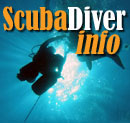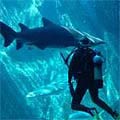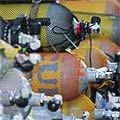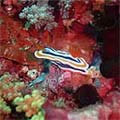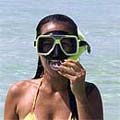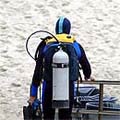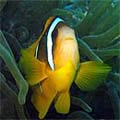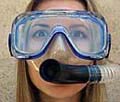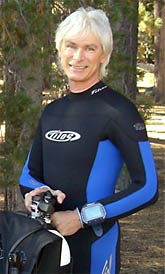« High Altitude Diving Certified! | Main | What the PADI and NAUI classes don't teach »
October 3, 2006
What to do between diving opportunities
Unlike golf or bowling or other pastimes with venues nearby, scuba diving, for most of us, is a sport that requires careful planning ahead. You can't just pick up your gear and go do it whenever the mood strikes. So what does a diver do between diving opportunities? And how does one guard against losing interest or drifting away from the sport? After all, there are statistics that say an alarming number of newly certified divers never go diving again, and an almost equally alarming number gets lost to the sport every year, just because it becomes too cumbersome to plan and wait.
Well, one way to keep the flame burining is to stay in touch with other divers. After I got my C-Card, I collected the emails of everyone in my small graduating class and have been sending status notes out on a more or less regular basis. That wasn't met with a great deal of response, but that's normal. Most people read but don't write. I also became peripherally involved with a group of divers who got stranded after their (and my) dive shop closed down. All of a sudden they had lost their focal point, the place where they met and booked their trips through. So they're trying to get together and organize their own trips. I helped by designing a community website for them. It's at www.goldrushdivers.com. Most have known each other for many years and I don't know if I'll become part of the group. But it's nice seeing how divers seek to communicate and organize. And it's practical, too. Group bookings can save money, and it's fun going places with friends.
Another thing I've been doing is reading. A lot. I've bought and read pretty much every scuba book I could get my hands on. Whenever I stop by at my local Borders bookstore I go to the sports section and look for diving books. Considering that there are supposedly millions of certified scuba divers in the US alone, there is a surprisingly small number of books out there for them. Golf? Baseball? Soccer? Tons of books of all kinds, but very few on scuba diving. So far I've read the Complete Diving Manual by Jack Jackson, Diving Science by Doctors Strauss and Aksenov, Diver Down by Michael Ange, Eyewitness Companions: Scuba Diving by Monty Halls and Miranda Krestovnikoff, Neutral Buoyancy by Tim Ecott, Scuba Diving & Snorkling for Dummies by John Newman, and The Last Dive by Bernie Chowdhury. Two or three others I still need to read, and a few days ago I ordered five more from Amazon.
If you want to get the quick and dirty on all of those books, I wrote reviews on each, accessible through scubadiverinfo.com. I also posted them on amazon.com.
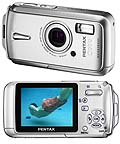 I also plan on doing underwater camera reviews for the website, and started with the Pentax Optio W10. This is not a camera sitting in a separate waterproof housing. Instead, although it looks just like a regular camera and is no larger, it is waterproof all by itself. Pentax says you can shoot at a depth of five feet for 30 minutes. Five feet means it's not a "real" diving camera, though it can likely handle a few feet more. Still, it's good enough to take to wet places and even snorkeling or perhaps river diving. As is, I checked it out in my pool. It was weird dunking what looks like just another little digicam into the water. But it didn't flood and worked perfectly well.
I also plan on doing underwater camera reviews for the website, and started with the Pentax Optio W10. This is not a camera sitting in a separate waterproof housing. Instead, although it looks just like a regular camera and is no larger, it is waterproof all by itself. Pentax says you can shoot at a depth of five feet for 30 minutes. Five feet means it's not a "real" diving camera, though it can likely handle a few feet more. Still, it's good enough to take to wet places and even snorkeling or perhaps river diving. As is, I checked it out in my pool. It was weird dunking what looks like just another little digicam into the water. But it didn't flood and worked perfectly well.
So there. That's what I've been doing since my last dive. And I can't wait to go under again as soon as possible!
Posted by conradb212 at October 3, 2006 10:59 PM
